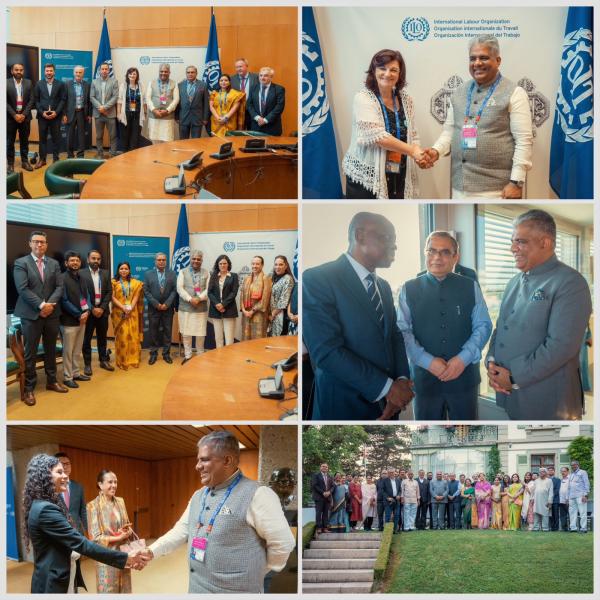
International Labour Conference Diary: Social Justice must be the foundation of the changing world of work
15/06/2023
BLOG
On Day 3 of my engagements at the 111th International Labour Conference of the International Labour Organisation in Geneva today, I met Ms Raquel Cecilia, Minister of Labour, Employment and Social Security, Government of Argentina.
We discussed ways to further cooperation.
I also met Ms Luisa María Alcalde Luján, Secretary of Labour and Social Welfare, Mexico.
With these bilateral meetings my formal engagements at the 111th Labour Conference based on the theme of Social Justice For All drew to a close.
The Conference had many learnings for the delegates from Member Countries and several positives for India. There was a wider consensus that in responding to the question on what the international community needs to do to achieve universal Social Justice. Among other things, there was a wider understanding that addressing climate change was crucial to achieve this end.
The delegates agreed that joint international efforts are critical to ensuring social justice.
Working under the vision of Hon’ble Prime Minister Narendra Modi ji, India believes that social justice must be the foundation of the changing world of work. Amid the common challenges, including the impact of the COVID-19 pandemic, it is important to ensure social justice because poverty anywhere is a threat to prosperity and security everywhere.
The International Labour Organisation and Member States at the Labour Conference were appreciative of the scale at which India is working to ensure social justice. During my interactions and interventions in Geneva, I had highlighted how ESIC was serving 31 million Insured Persons and their family members which takes the total number of beneficiaries to 120.3 million persons, and that ESIC has 161 hospitals, 1,502 dispensaries and 8 medical colleges across the country. I also mentioned that EPFO is one of the world’s largest social security organisations in terms of clientele and volume of financial transactions. At present, it maintains accounts of more than 270 million members.
The fact that e-Shram has over 289 million subscribers and that it is being integrated with the employment service portal, skill development portal and pension portal for informal sector workers, which will help such workers to seamlessly take these benefits drew a lot of curiosity at the event.
India has taken extremely significant efforts to ensure social justice is the bedrock of labour policy formulations. At the same time, India has succeeded in ensuring ease of doing business.
The Government of India has enacted the four Labour Codes:
- Code on Wages, 2019
- Industrial Relations Code, 2020
- Code on Social Security, 2020
- Occupational Safety, Health and Working Conditions Code, 2020
These codes aim to strengthen labour protection for both formal and informal sector workers in terms of statutory minimum wage, social security and healthcare etc. The Code on Social Security also provides for social protection of gig and platform workers through provisions for setting up of a social security fund.
The government has also taken various steps to improve women’s participation in the labour force and quality of their employment. A number of protective provisions have been incorporated in the labour laws for equal opportunity and congenial work environment for women workers. The government has enhanced the paid maternity leave from 12 weeks to 26 weeks, and made provisions for mandatory crèche facility in the establishments having 50 or more employees, and has permitted women workers in the night shifts with adequate safety measures, etc.
By collecting the data on workers, e-Shram is ensuring that even migrant workers are brought wholly under the social security net of the government. This step, working along with the Direct Benefit Transfer model of India, will ensure that benefits of government’s welfare schemes and the social security net reaches the workers wherever they are in the country.
But India isn’t just working on worker mobility within the country but also across borders. At the Labour Conference, I to take ahead Hon’ble PM Modi ji’s vision in this regard by talking to Member States on deepening ties to ensure the safety and security of workers – both skilled and unskilled – across borders.
These steps show India’s intent in ensuring equity and equality in opportunities.
As the International Labour Conference drew to a close, the world community pledged to work together for the prosperity of workers and creating a just and equitable environment for them.
